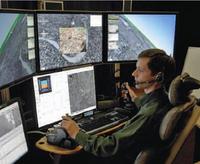-
Oakland wants to write its own gun control laws
The leaders of Oakland, California, say that state gun laws are not suitable for their crime-infested city. They want to write their own gun law, saying it would not ban guns, but would allow the city to have tighter controls on who owns and who is selling them and buying them.
-
-
U.S. secretly obtains AP phone records to identify source of story

In what the AP calls a “massive and unprecedented intrusion” into the news organization’s news work, the U.S. Justice Department secretly gathered two-months-worth of telephone records of the agency’s reporters and editors. The AP says the records listed incoming and outgoing calls to the offices and homes of reporters and editors. The Justice Department began collecting the phone records in order to identify the source or sources of a 7 May 2012 AP story which detailed a secret CIA operation in Yemen to intercept an al Qaeda-sponsored attempt to load an IED onto a U.S.-bound airplane.
-
-
The two sides in the gun control debate are gearing up for Round 2
A few weeks ago, when the Senate was considering legislation to expand background checks for gun buyers and other gun-control measures, gun-rights advocate successfully organized and campaigned at the grass-root level, exerting pressure on enough wavering Senators, including four Democrats from Red stated who face re-election in 2014. Now, as the Senate majority leader is getting set to introduce the gun-control measures again, supporters of gun control legislation are trying to emulate the grass-root mobilization performance of gun-rights advocates.
-
-
Pennsylvania emergency professionals receive WMD training
The Center for Domestic Preparedness (CDP) in Alabama hosted more than a hundred emergency professionals from the Pennsylvania South Central Mountains Regional Task Force’s Health and Medical Committee for in-depth response-to-WMD training.
-
-
U.S. considering revamping wiretap laws
The White House is reviewing an FBI plan to overhaul surveillance laws in order to make it easier for law enforcement officials to wiretap citizens using the Internet to communicate rather than phone services.
-
-
Master “remote” control for all military unmanned systems

Historically, unmanned systems have been developed and fielded as individual items built by different vendors, which has led to increased spending, from $284 million in 2002 to more than $3 billion in fiscal year 2010. Researchers have developed something similar to a master remote control for separate components of differing brands of entertainment systems: it is called the Common Control System, and it will control military ground, air, and undersea unmanned systems across the services.
-
-
Japan has an earthquake early-warning system, but California is yet to deploy one

The 2011 Fukushima earthquake claimed many lives, but at least some lives were saved by an early warning system designed ten years ago at Caltech and deployed in Japan in 2007. The system gives people about a minute to prepare for the impending tremor. California is yet to deploy the system.
-
-
Privacy, cost concerns check drive for more surveillance cameras

Law enforcement agencies in cities across the United States are campaigning to increase surveillance on city streets, impressed with the effectiveness of video surveillance in helping the Boston Police identify the two suspects in the Boston Marathon bombings. This campaign to expand law enforcement’s surveillance power is likely to run into stiff opposition, as Americans have proven suspicious of allowing the government powers which would infringe on privacy. Expanding surveillance networks also costs money, and these are tight budgetary times.
-
-
Texas becomes gun-friendlier
Texas is already considered one of the most gun-friendly states in the nation, and on Saturday it became even more so when the State House passed twelve different gun bill which would make it easier to own and carry guns in the state. Some of the bills – for example, the one which would punish police officers or government officials by up to a year in jail and a $4,000 fine if they attempt to enforce federal firearms limits in Texas – may be found to be unconstitutional.
-
-
U.S. sharply disputes UN official's claim that Syrian rebels used chemical weapons
The United States sharply challenged claims by a UN official – who is not a member of the UN investigative commission looking into to the possible use of chemical weapons in Syria – that the rebels, rather than the Assad regime, used sarin nerve gas near the city of Aleppo on 19 March. The UN investigative commission looking into the incident distanced itself from the official’s comments.
-
-
Iowa sex offenders allowed to keep guns
A law enacted two years ago has made it possible for more than fifty sex offenders in Iowa to apply for gun permits. Sheriffs and some lawmakers are uncomfortable with the situation, but advocates for sex offender rehabilitation say such offenders are not necessarily dangerous criminals.
-
-
Hollow point ammunition is more effective and safer to use

While there is a legitimate concern about the number of rounds purchased by DHS, there should be no questions about the department’s decision to purchase hollow point rounds. Hollow point rounds do not explode on impact, but rather expand on contact. They are less likely to penetrate completely through a body and strike innocent bystanders. Hollow point rounds are standard ammunition of law enforcement agencies in the United States.
-
-
Heavy Israeli air strikes near Damascus destroy Iranian missile shipment to Hezbollah

Israel launched heavy airstrikes Friday and Sunday on a military base near Damascus, destroying shipments of sophisticated Iranian Fateh-110 missiles to Hezbollah. These were the second and third such strikes in as many months. Israel’s first strike on Syrian targets took place on 30 January. That strike destroyed advanced SA-17 surface-to-air missiles the Assad regime was trying to ship to Hezbollah on orders of Iran.
-
-
Woman who killed N.J. trooper in 1973 makes the FBI’s most wanted list
Joanne Chesimard, a former member of the Black Liberation Army who killed a New Jersey state trooper in 1973, has become the first woman to make the FBI’s most wanted list. The reward for her capture and arrest has doubled to $2 million. In 1979 Chesimard escaped jail, and since 1984 has been living in Cuba, using the name Assata Shakur.
-
-
Delaware develops comprehensive schools safety program
Delaware has become the first state to develop a comprehensive school safety model which includes a central portal for school safety plans. A Web-based portal to serve as a repository for all public school safety plans in the state will be developed, and will become accessible to school safety teams in time for the new school year this fall.
-
More headlines
The long view
Why Ukraine’s AI Drones Aren’t a Breakthrough Yet
Machine vision, a form of AI, allows drones to identify and strike targets autonomously. The drones can’t be jammed, and they don’t need continuous monitoring by operators. Despite early hopes, the technology has not yet become a game-changing feature of Ukraine’s battlefield drones. But its time will come.
